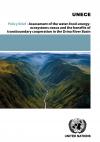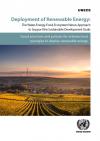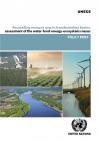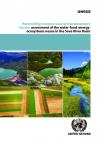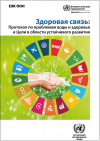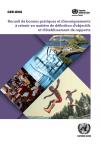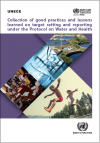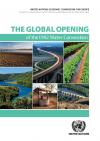Water Publications
Displaying Results 121 - 140 of 544
- English
This publication presents the Principles for Effective Joint Bodies for Transboundary Water Cooperation that were formally adopted by the Meeting of the Parties to the Water Convention at its seventh session (Budapest, 17-19 November 2015). Countries sharing transboundary waters worldwide are
- العربية
This publication presents the Principles for Effective Joint Bodies for Transboundary Water Cooperation that were formally adopted by the Meeting of the Parties to the Water Convention at its seventh session (Budapest, 17-19 November 2015). Countries sharing transboundary waters worldwide are
- English
This report presents the findings from the assessment of the water-food-energy-ecosystems nexus, linked with a study of benefits of transboundary cooperation, in the Drina River Basin, mainly shared by Bosnia and Herzegovina, Montenegro and Serbia which was carried out from 2016 to 2017 in the
- Pусский
Implementation Plan for the Strategic Framework for Adaptation to Climate Change in the Dnister River Basin
Download the publication in English and
- English
Implementation Plan for the Strategic Framework for Adaptation to Climate Change in the Dnister River Basin
Download the publication in English and
- English
This policy brief synthesizes the main findings and recommendations from the assessment of the water-food-energy-ecosystems nexus ─ essentially of intersectoral links, trade-offs and benefits ─ in the Alazani/Ganykh River Basin, shared by Azerbaijan and Georgia in the Caucasus, that has been
- English
This policy brief synthesizes the main findings and recommendations from the assessment of the water-food-energy-ecosystems nexus, linked with a study of benefits of transboundary cooperation, in the Drina River Basin, mainly shared by Bosnia and Herzegovina, Montenegro and Serbia which was
- English
The 2030 Agenda for Sustainable Development includes Sustainable Development Goal (SDG) 7 on access to energy and the related targets set the ambition for increasing the share of renewable energies in the energy mix. Their achievement is closely linked water management (part of SDG 6 on water and
- English
This policy brief provides an introduction towards the different stages of and benefits from an assessment of the water-food-energy-ecosystems nexus, with a specific focus on resource use in transboundary basins. It summarizes the experience from the first three transboundary basins where a
- English
This policy brief synthesizes the main findings and recommendations from the nexus assessment of the Sava River Basin shared by Bosnia and Herzegovina, Croatia, Montenegro, Serbia and Slovenia which was carried out from 2014 to 2016 in the framework of the UNECE Water Convention’s Programme of Work
- English
Coordination between the water, energy, food and environment sectors is fraught with difficulties at the national level and the complexity increases substantially in transboundary basins. The “nexus approach” to managing interlinked resources has emerged as a way to enhance water, energy and food
- English
Coordination between the water, energy, food and environment sectors is fraught with difficulties at the national level and the complexity increases substantially in transboundary basins. The “nexus approach” to managing interlinked resources has emerged as a way to enhance water, energy and food
- Pусский
Water, sanitation and health are at the core of the 2030 Agenda for Sustainable Development.The 1999 Protocol on Water and Health is a powerful tool to promote and operationalize the achievement of the 2030 Agenda and its Sustainable Development Goals. With its strong integrated and
- English
Water, sanitation and health are at the core of the 2030 Agenda for Sustainable Development.The 1999 Protocol on Water and Health is a powerful tool to promote and operationalize the achievement of the 2030 Agenda and its Sustainable Development Goals. With its strong integrated and
- Français
The Guidance Note on the development of action plans aims to help countries in translating the priorities identified through the self-assessment into actions. Specific Equitable Access Action Plans are needed to guide country (or sub-national entity) efforts to achieve equitable access to water
- English
The Guidance Note on the development of action plans aims to help countries in translating the priorities identified through the self-assessment into actions. Specific Equitable Access Action Plans are needed to guide country (or sub-national entity) efforts to achieve equitable access to water
- Pусский
The Guidance Note on the development of action plans aims to help countries in translating the priorities identified through the self-assessment into actions. Specific Equitable Access Action Plans are needed to guide country (or sub-national entity) efforts to achieve equitable access to water
- Français
The objective of the Collection of good practices and lessons learned on target setting and reporting under the Protocol on Water and Health is to provide concrete advice to countries planning to embark on the process of setting, revising or implementing targets, and reporting on the progress
- English
The objective of the Collection of good practices and lessons learned on target setting and reporting under the Protocol on Water and Health is to provide concrete advice to countries planning to embark on the process of setting, revising or implementing targets, and reporting on the progress
- English
The Convention on the Protection and Use of Transboundary Watercourses and International Lakes (Water Convention) was adopted in 1992 and entered into force in 1996. It brings together almost all countries sharing transboundary waters in the pan-European region, and is expected to achieve broader



